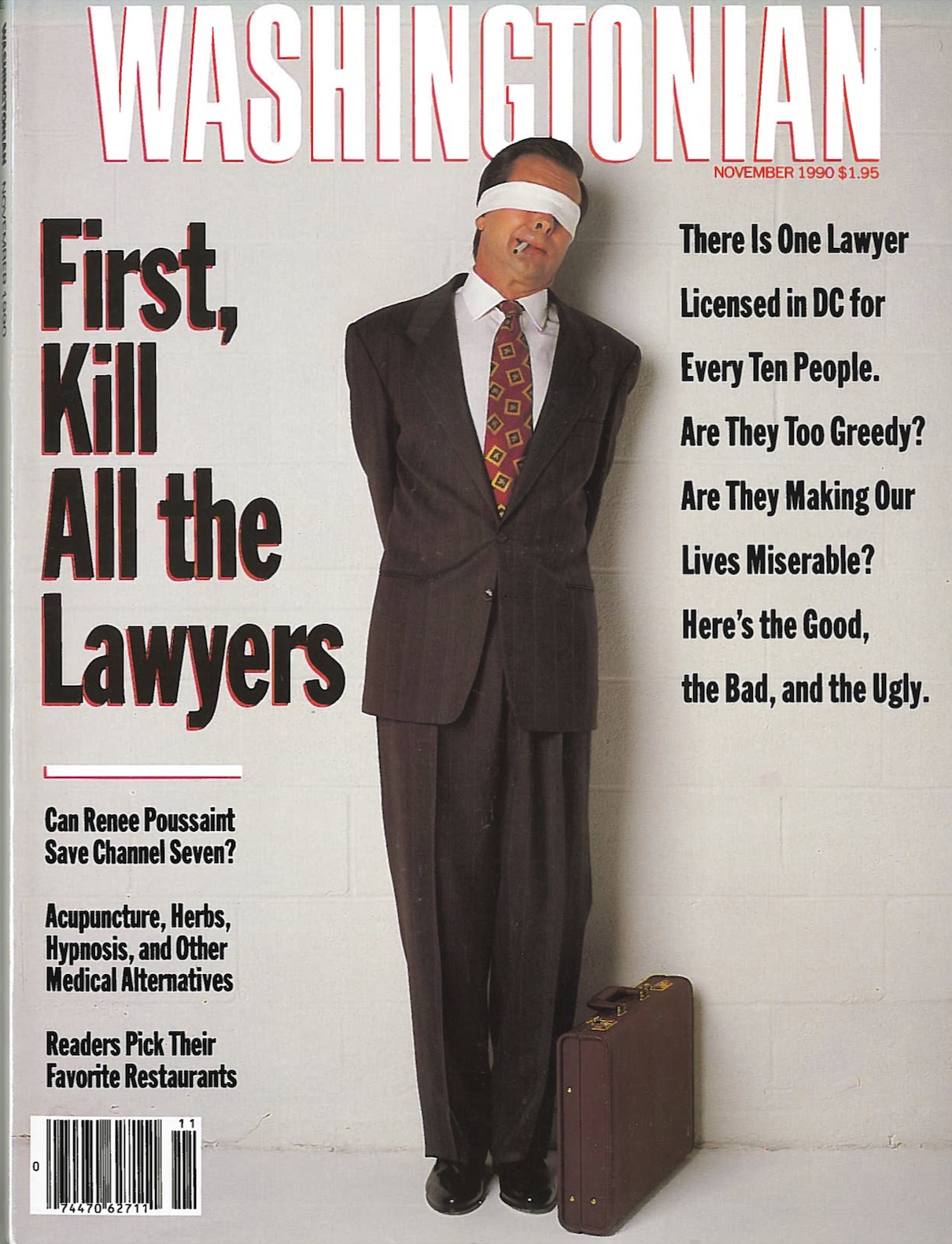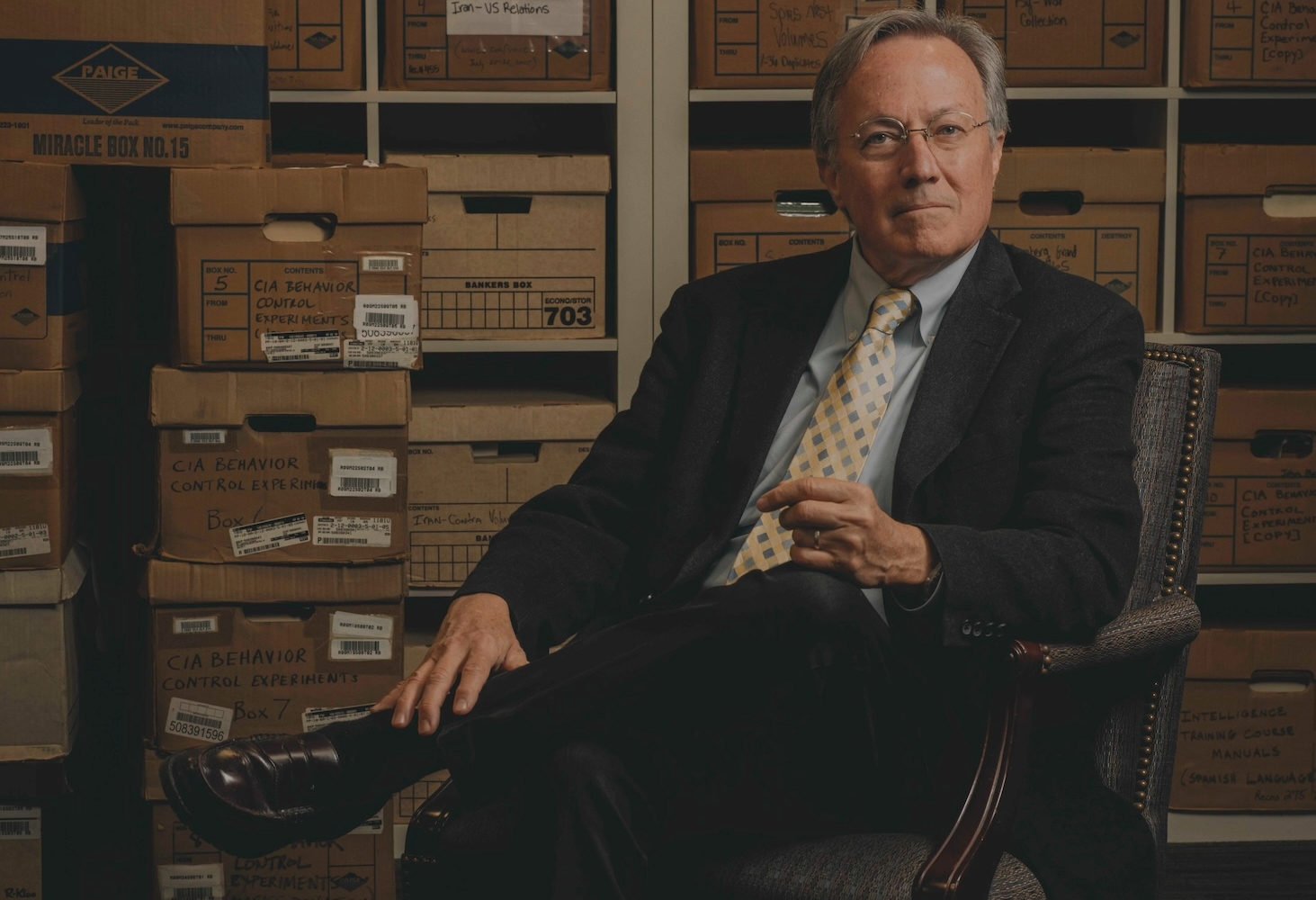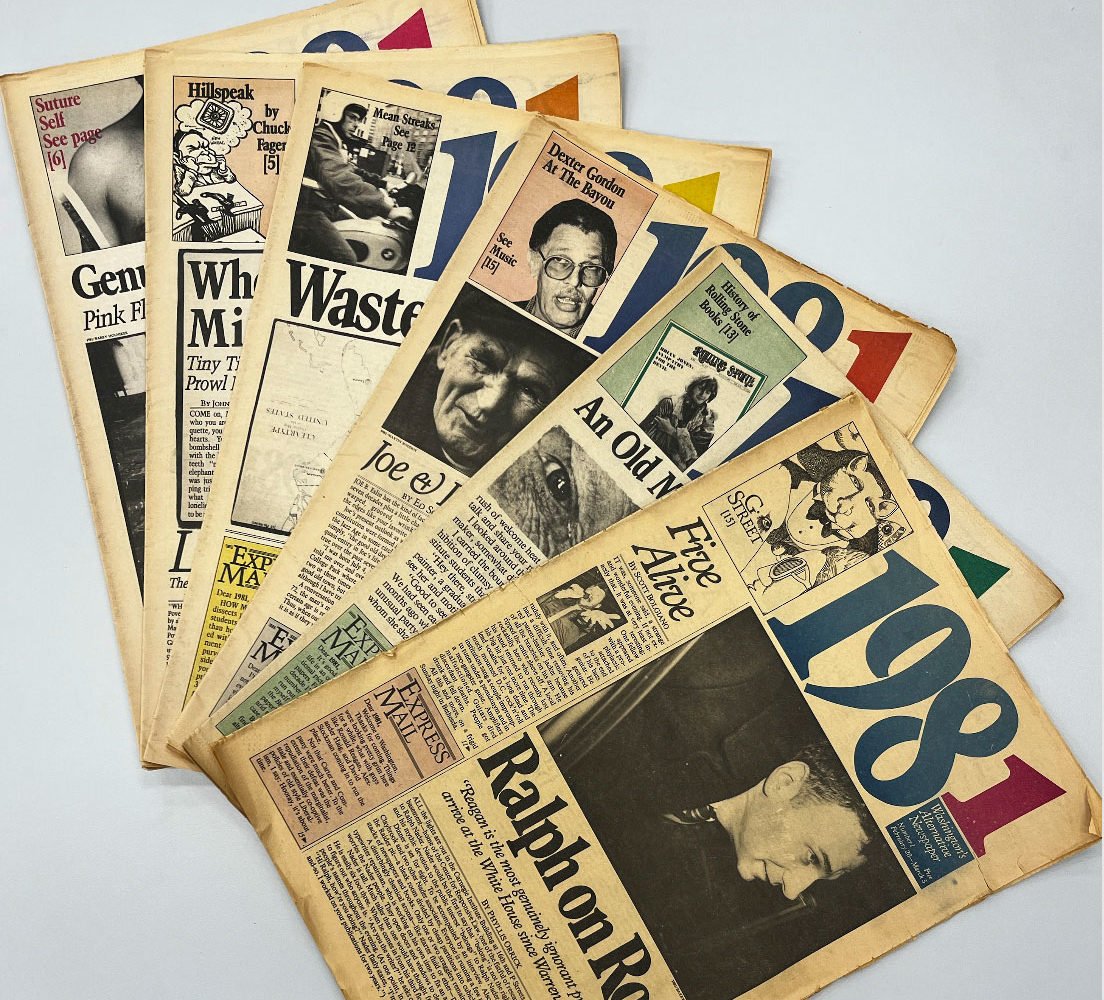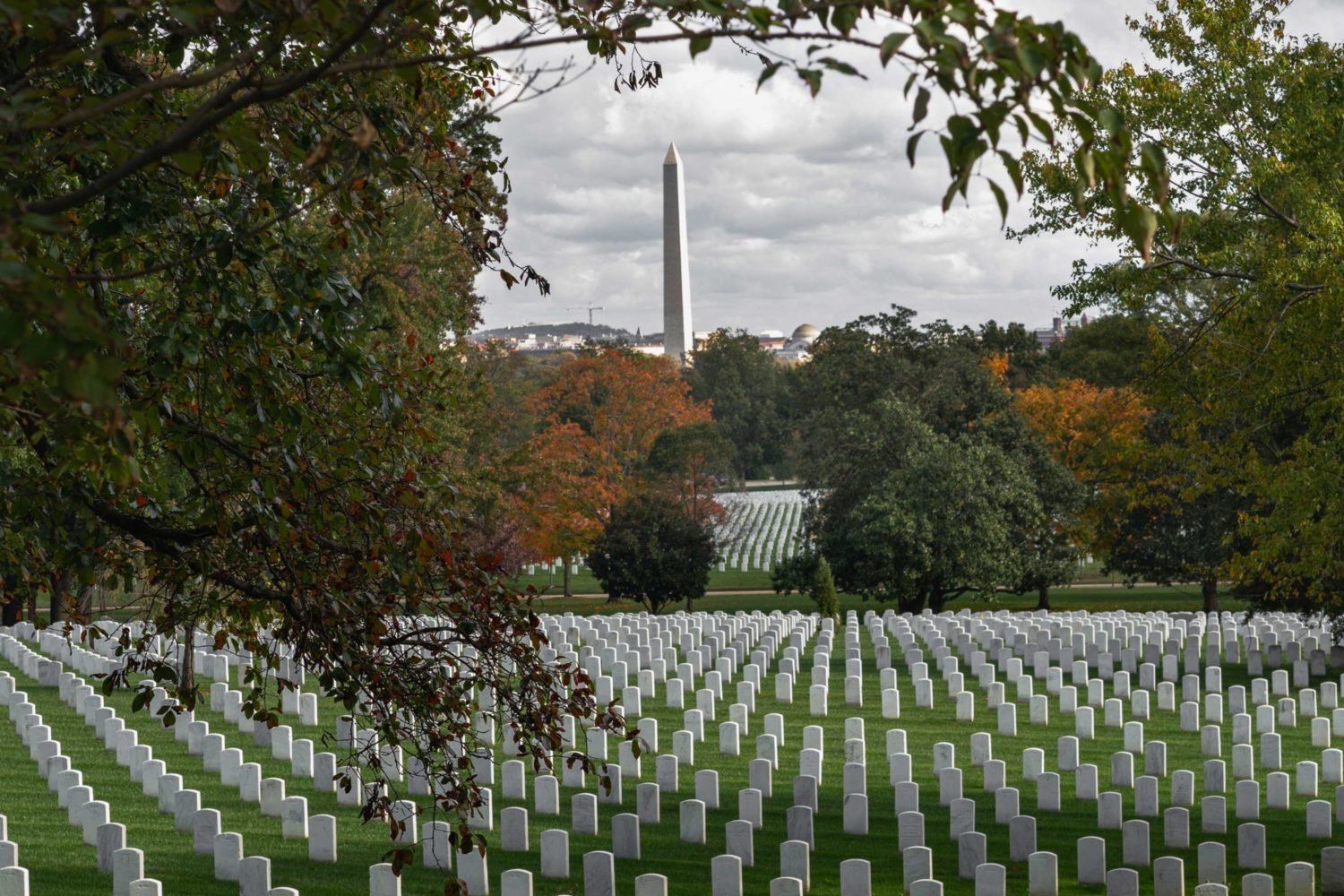In the fall of 1990, writer John Sansing walked into Mike’s Crab House, near Annapolis, in a Folger Theatre T-shirt inscribed with the Henry VI, Part II line, “The first thing we do, let’s kill all the lawyers.” The result, in Sansing’s words: “At least three strangers called out in approval. Two of them wanted to know where to get the T-shirt.”
The scene became one of many anti-lawyer anecdotes featured in Sansing’s “First, Kill All the Lawyers,” the cover story for our November 1990 issue. An ex-lawyer himself, Sansing traced the rise of the legal profession in Washington and its attendant decline in prestige: For every ten DC residents, he reported, there was one licensed lawyer in the city, all of whom were practicing a profession that was “slightly less respected than streetwalking.”
Naturally, reactions to the story were divided: legal groups like the Montgomery County bar association wrote in to complain that the story was one-sided, while everyday folks like John Stossel sent their praise. (Stossel apparently wrote a one-line letter: “This was a truly wonderful article!”)
But the attorneys also made a counterpoint: Weren’t journalists at least as much of a plague on the city as lawyers?
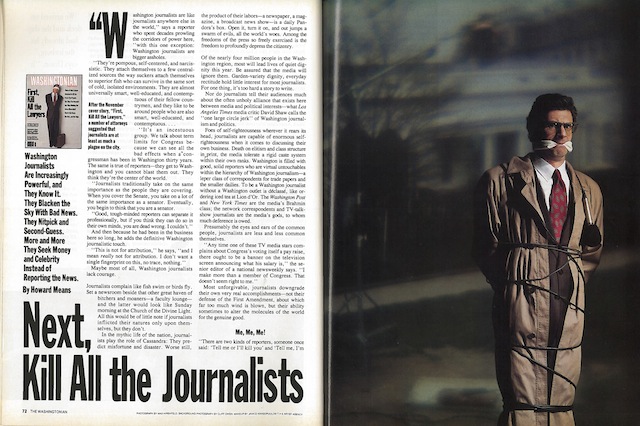
We tested that claim in our May 1991 issue, with a story called “Next, Kill All the Journalists” that led with a staged photo of a newsman gagged and tied up by his own mic cord. The feature, by Howard Means, quoted more than a dozen scathing critics of Washington journalism, but the hard data showed that attorneys edged out reporters when it came to hate: In a survey of 453 “local leaders,” 70 percent of respondents said they felt “some” or a “great deal of” resentment toward lawyers–worse than the 53 percent who said they felt that way about journalists, and the 35 percent who felt that way about auto mechanics. (The most resented professions in our survey: telephone solicitors, at 93 percent, and politicians, at 76 percent.)
But more than a decade before Twitter and Periscope had been invented, years before the White House Correspondents’ Association Dinner became “nerd prom,” the hate was still real: “Some journalists are good, hardworking and honest,” one military officer wrote as part of the story’s accompanying survey. “Others are not….All in all, I wouldn’t want my daughter to marry one.”
Below, 11 additional reasons why your daughter should reconsider marrying that smooth-talking Politico reporter, all culled from our ’91 feature:
- “If you are not in journalism or in politics, you might as well not live in Washington. I don’t mean to denigrate any number of good, talented, skeptical reporters, but the result is that to a significant extent Washington journalism and Washington politics become one large circle jerk.” –David Shaw, Los Angeles Times media critic
- “There are two kinds of reporters, someone once said: ‘Tell me or I’ll kill you’ and ‘Tell me, I’m an orphan.’ ” —Lars-Erik Nelson, New York Daily News Washington bureau chief
- “On the whole, journalists don’t feel they have to be extremely well versed in the subject matter. Sometimes that puts a drastic limitation on what they’re capable of understanding and therefore what they are capable of reporting on….[I]n general journalists are remarkably cavalier about book learning.” —Nelson Polsby, director of Cal-Berkeley’s Institute of Governmental Studies
- “A lot of what war correspondents do is bang around, run into things, assault situations, and then hope that something will coalesce out of that.” —William Marmon, former war reporter for Time magazine
- “The journalists are constantly screaming that they’ve got to have something new, so you come up with gimmicks, with punch lines. The bottom line is that you trivialize politics and campaigns to keep them happy….[B]asically they think the world is centered around them. They’re children. They’ve got this child-like view that the world exists for their benefit: ‘Put on a show for me.’ ” —Anonymous former press secretary
- “What journalists do is watch the battle from up on a hill. Then when the battle is over, they come down and shoot the wounded.” —Anonymous “public relations man”
- “What drives me up the wall are the insider things–Jim Baker hates Brent Scowcroft, all this gossipy drivel that passes for what’s going on. I heard that the standard for this was set by Katharine Graham, who really loved all this for her dinner table.” —Anonymous “long-time Washington correspondent”
- “Journalists in Washington are lazy.” —Anonymous “executive director of an education association”
- “The media try to become the event, rather than report on it.” —Anonymous “president of an electronics firm”
- “The constant attention to the negative substantiates the axiom that the difference between a puppy and a TV news reporter is that the puppy stops whining after six week.” —Anonymous military officer
- “Washington journalists are like journalists anywhere else in the world, with this one exception: Washington journalists are bigger assholes. They’re pompous, self-centered, and narcissistic. They attach themselves to a few centralized sources the way suckers attach themselves to superior fish who can survive in the same sort of cold, isolated environments. They are almost universally smart, well-educated, and contemptuous of their fellow countrymen, and they like to be around people who are also smart, well-educated, and contemptuous….It’s an incestuous group. We talk about term limits for Congress because we can see all the bad effects when a congressman has been in Washington thirty years. The same is true of reporters–they get to Washington and you cannot blast them out. They think they’re the center of the world….This is not for attribution, and I mean really not for attribution. I don’t want a single fingerprint on this, no trace, nothing.” –Anonymous reporter “who spent decades prowling the corridors of power here” in DC

